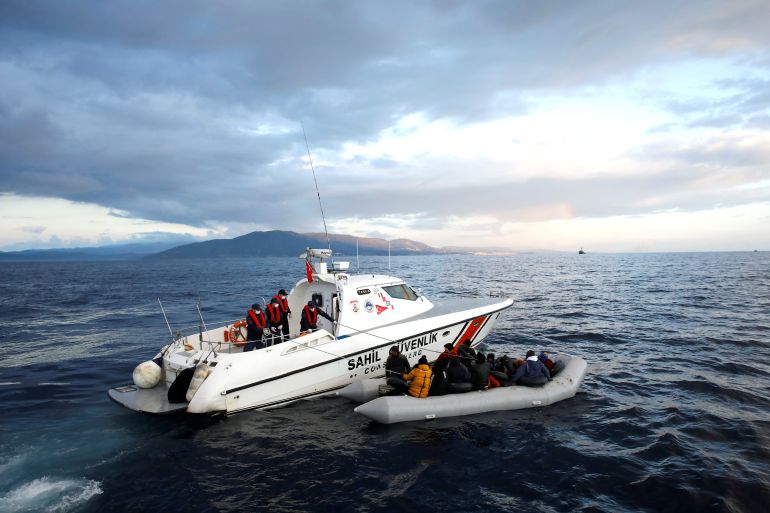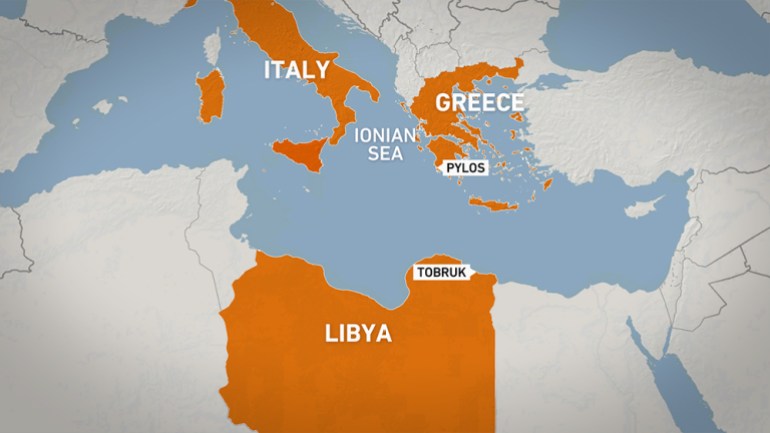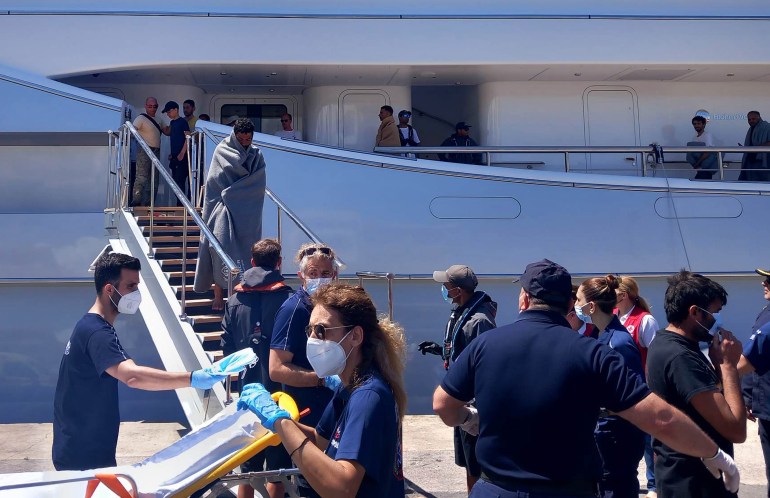Survivors: ‘Greek coastguard was next to us when boat capsized’
Two Syrian refugees recall their harrowing journey and pin blame on the coastguard for the devastating shipwreck.

Names marked with an asterisk have been changed to protect identities.
Pylos, Greece – As soon as the overloaded fishing trawler set off from Libya last month, the danger seemed obvious to Ahmed*, a 21-year-old Syrian.
Keep reading
list of 3 itemsAt least 209 Pakistanis among victims of Greece boat wreck
‘If you stay, you die, but if you go you also die’
“The boat was too heavy,” he told Al Jazeera.
“We were sitting next to each other, and there was a constant fear of sinking.”
On the derelict blue ship that was soon to hit international headlines, he saw about 750 people crammed together, shoulder-to-shoulder, unable to move. They had all hoped to eventually reach Europe.
In a few days, he would see hundreds of these people drown as a Greek coastguard ship floated nearby.
Ahmed fled Syria with his friend Mohammed*, 23. They both asked to use pseudonyms because they fear the Greek government would punish them for speaking out about what they saw that night.
They are two of the 104 survivors of the shipwreck off the coast of Pylos, Greece. Seventy-eight people have been confirmed dead.
Like hundreds of other people on board, their third companion, Mohammed’s cousin, was never found.
Their path to the central Mediterranean was taken in many steps. Ahmed and Mohammed said they left home hoping for a future without violence.

Their journey took them to Lebanon, then Egypt and Libya.
They spent about a month in Libya, where smugglers kept them closed up in an apartment with Egyptians, Pakistanis and other Syrians also making the journey.
Mohammed said the smugglers beat the Egyptians and Pakistanis, constantly cursing and insulting them.
Finally, in the first days of June, they were told, “You are leaving today.”
They were put on the back of trucks that drove to the shore, were loaded onto small boats and were taken to a trawler, the Adriana, out in deeper waters.
“They were beating people there,” Ahmed said.
“They were beating them while taking them to the lower deck of the boat. … It was very bad down there. It smelled of diesel and fish. You couldn’t breathe.”
Ahmed and his companions managed to pay a bribe of $200 to get themselves a spot on the upper deck.
But wherever the passengers sat on the ship, they were wedged together.
Women and children were kept below in the hold. From their cramped spot on the top deck, the young men could see the sea.
‘People were starting to lose consciousness’
From the second day of the voyage, the boat’s engine started breaking down.
“They would repair it, and after a while, it would break down again,” Mohammed said. “Every time they repaired it, it would stop again after two to three hours.”
After the second day at sea, food and water ran out. Panic began to percolate across the ship.
“At that time, people were starting to lose consciousness,” Ahmed said.
“They were falling on the ground. They were fainting. Some were shaking. We were seeing tens, hundreds of people in this state.”
They heard fights were breaking out all across the boat due to hunger, thirst and fear.
“Me, Ahmed and my relative who is now missing were always trying to keep our spirits up,” Mohammed said. “When someone cried, we made jokes. ‘We will make it,’ we were saying to ourselves. But everyone was going crazy.”
By the fourth day, they heard disturbing news from the hold.
“Some people coming up from below said, ‘There are dead people down there,’” Ahmed said.
“They said there were six dead bodies on the boat. Five bodies were down below, and we didn’t see them. One was on the upper deck. We saw him.”

Ahmed and Mohammed said the passengers started telephoning the Italian authorities and the Greek coastguard to ask for help.
“From the fourth day onwards, the Greek coastguard had been aware of us,” Mohammed said.
By the fifth day, June 13, they said it looked like the Adriana had stopped moving completely.
In the afternoon, a helicopter flew overhead.
The passengers could not understand from the deck, but it was the Greek coastguard. In the afternoon, one and then another commercial ship passed by and tossed those on board water over the waves.
“People were saying: ‘Take us with you.’ They were saying, ‘No.’” Mohammed said. “We asked for help, but they refused to help us.”
A Greek coastguard vessel finally approached the fishing trawler around midnight in the first minutes of June 14, the friends said. “‘Follow us,’ they told us. We followed them,” Mohammed said.
“Half an hour later, our boat stopped completely. It could not move. They came back and tied us to their boat.”
Ahmed and Mohammed said the coastguard started to tow their stalled-out trawler, but it took a sharp turn, and the Adriana heaved precariously left, then right, then capsized.
“They were right next to us when it capsized. In the moment it sank, they moved away from us. They deliberately made us sink,” Mohammed said. “We were standing on top of the boat, and we were able to see everything clearly.”
Tossed into the dark Mediterranean Sea, hundreds of people tried to find something to cling onto, some way to survive. “People were holding onto me,” Ahmed said.
“I was going under the water and getting away from people. Every time I got away, I would come across someone else, and they would hold onto me to save themselves. When someone grabbed onto me, we both went underwater together.”
After an hour and a half, Ahmed said he spotted an inflatable coastguard boat and swam towards it.
“They were 200 or 300 metres [220 to 330 yards] away from us,” he said. “I swam to them and got into the boat. They did not come close to us to save us. They were standing far away, and those who could swim were going towards them, like me.”
As he made his way towards the inflatable boat, Ahmed had to push aside bodies floating in the water.
Once taken to the larger coastguard boat, Ahmed was reunited with Mohammed. The two hugged each other, overwhelmed and elated to have found each other.
They started asking about their third companion. He had not made it, and they realised how incomplete their relief was.
The survivors of the shipwreck were taken ashore. Mohammed said that when they were first held in the Greek city of Kalamata, the authorities came to take his testimony of the tragedy three or four times.
“When we told them that we had been towed with a rope, they stopped,” he said. “They were saying that the problem was our boat. They wrote our statements with their own words. They did not write down what we said. They made us say it and write it down.”
Ahmed said no officials have ever taken his testimony.
‘Accountability vacuum’
Both men are now in the Malakasa refugee camp, 40km (25 miles) north of Athens. They are awaiting their asylum claims to be processed. Mohammed is desperate for news of his cousin, even if that news is confirmation he is dead.
Ahmed’s and Mohammed’s accounts contradict the account of the Greek coastguard, which has said the passengers of the Adriana refused aid, it was only immobile for about 20 minutes before it capsized and the coastguard had not towed the boat prior to it capsizing.
Survivors’ accounts line up with other evidence.
The Greek investigative website Solomon has published emails showing that the Greek authorities had been notified that the ship was in distress by 6pm (15:00 GMT) on June 13. And tracking data published and verified by the BBC and The New York Times show that the trawler was not moving for at least seven hours before it capsized.
When asked to comment on allegations that the coastguard towed the boat and was involved in the shipwreck, the Greek Ministry of Maritime Affairs and Insular Policy told Al Jazeera: “The required information is part of the investigation procedure that is being conducted under strict confidentiality based on the instructions given by the prosecutor of the Supreme Court. Regarding the details of the operation plan of the Hellenic coastguard, no further comments can be made by our service.”
Fingers have been pointed at the Greek coastguard for both the shipwreck and its large death toll.
“It has been evidenced that the Hellenic coastguard uses a range of tactics to move boats they have intercepted at sea into different territorial areas to avoid responsibility for search and rescue and the lodging of their applications for international protection,” said Hope Barker, a policy analyst at the Border Violence Monitoring Network.
“Whilst this usually includes towing boats back to Turkish territorial waters, it is equally likely that if the boat was closer to Italian territorial waters, they would try to transfer it there instead.”
The organisation is calling for an independent investigation and for Frontex, the European Union’s border agency, to withdraw from Greece.
“Violations of fundamental rights by the Hellenic coastguard are routine and systematised operations that have proven to be under-investigated by the Greek state. There is an accountability vacuum that allows these actions to continue unabated,” Barker said.
In Malakasa, Mohammed said he cannot stop thinking about the moment the boat capsized and the screams of the people around him. He does not know how he survived in the water.
“I shouted Ahmed’s and my cousin’s names for a while,” he said. “In that moment, I heard a voice screaming, ‘Mother! Mother!’ I asked that person for his name, and he said, ‘Fuat’.
“He and I told each other our names, so that whichever of us survived would be able to bring the news to the other’s family.”